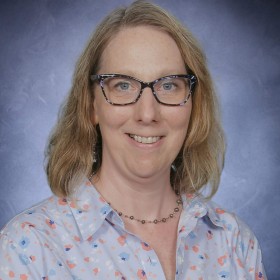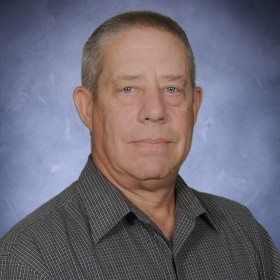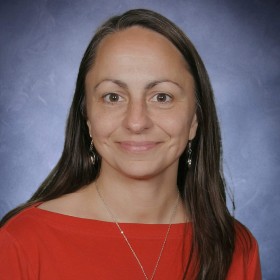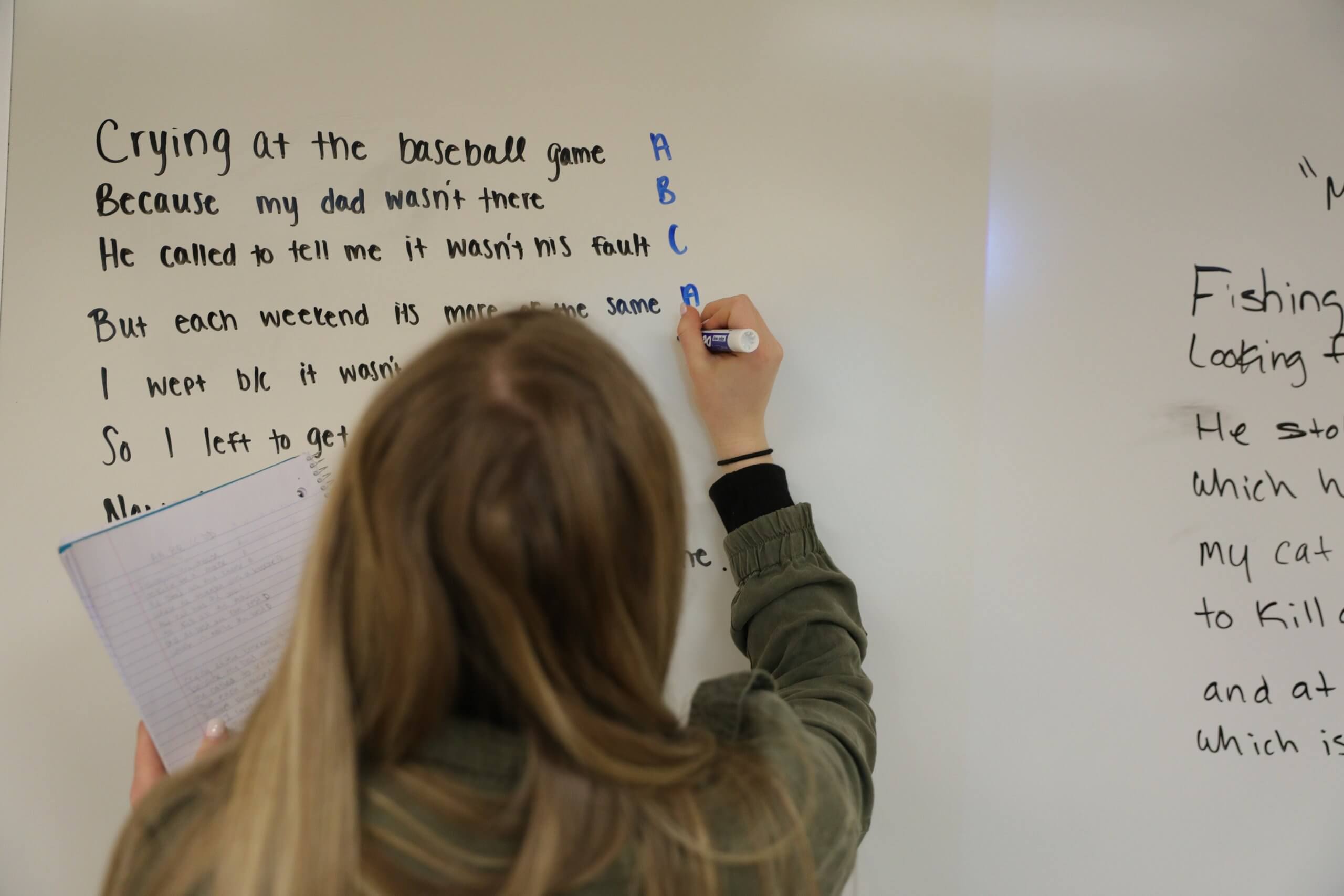Overview
If you love reading literature, or if you love to write, or if you’re fascinated with the origins of the English language, then you should pursue a degree in English. This program offers broad exposure to the literature, history, and culture of the English language. You will learn critical thinking skills as well as how to write clearly, persuasively, and creatively. An English degree at Great Bay helps you translate your love for literature and your creative talents into a successful academic career and a fulfilling future solving real-world problems.
Why Great Bay?
The English program at Great Bay offers a good deal of flexibility in choosing electives. After completing the basic degree requirements, you’ll be able to focus your studies on literature, writing, film, and the humanities. Other program highlights include our small discussion- and research-oriented classes and the opportunity to complete an internship. The Great Bay English department is currently the only community college in New Hampshire to offer an internship in the humanities course.
Career Options
- Teacher
- Writer
- Publisher
- Editor
- Communications specialist
- Government consultant
- Lawyer
- Business executive
Related Degrees
Internships
GBCC students enrolled in English, Humanities and Liberal Arts can register for English 289: Internship in the Humanities (offered in the Spring semester). This 3-credit course is designed to offer humanities majors an opportunity to put the writing, communication, critical thinking, creative, and collaborative skills developed in their coursework into practice in the world of humanities-related work. Students will explore answers to the question “What can I do with my humanities degree?” while ideally focusing on racial and/or social justice work in a semester-long internship project.
Interested students should contact Dr. Emily M. Hinnov ([email protected]) or Prof. Cindy Walton ([email protected]) for eligibility requirements.
Curriculum Outline
The classes and coursework required is as follows:
First Year: Fall Semester
| Course ID | Course | Theory | Lab | Credits |
|---|---|---|---|---|
| ENGL110G / 111G | College Composition I / College Comp with Lab | 4 | 0/2 | 4/5 |
| CRIT150G | Critical Thinking in the Humanities | 3 | 0 | 3 |
| MATH145G / 147G | 4/5 | 0 | 4/5 | |
| Or higher in the Applied Math / Statistics Pathway | ||||
| English Elective | 3 | 0 | 3 | |
| 100 Level English Elective, except ENGL117 | ||||
| Total Credits | 14 / 16 | |||
First Year: Spring Semester
| Course ID | Course | Theory | Lab | Credits |
|---|---|---|---|---|
| ENGL214G | Introduction to Creative Nonfiction | 3 | 0 | 3 |
| MATH 225G, 215G or 170G | Math Elective | 4 | ||
| ENGL127G | Introduction to Literary Analysis | 3 | 0 | 3 |
| 200 Level Survey Elective | 3 | 0 | 3 | |
| ENGL Survey Course electives choices are ENGL209G, American Literature through the Civil War, ENGL220G, American Literature after the Civil War, ENGL223G British Literature to 1800, and ENGL224G, British Literature from 1800 to the Present. | ||||
| Total Credits | 13 | |||
First Year: Summer Semester
| Course ID | Course | Theory | Lab | Credits |
|---|---|---|---|---|
| Social Science Elective | 3 | 0 | 3-4 | |
| Total Credits | 3-4 | |||
Second Year: Fall Semester
| Course ID | Course | Theory | Lab | Credits |
|---|---|---|---|---|
| ENGL2XXG | 200 Level Survey Elective | 3 | 0 | 3 |
| ENGL2XXG | 200 Level English Elective | 3 | 0 | 3 |
| Lab Science Elective | 3 | 2/3 | 4 | |
| Social Science Elective | 3 | 0 | 3-4 | |
| Foreign Language/Humanities/Fine Arts Elective | 3 | 0 | 3 | |
| Total Credits | 16-17 | |||
Second Year: Spring Semester
| Course ID | Course | Theory | Lab | Credits |
|---|---|---|---|---|
| ENGL2XXG | 200 Level Survey Elective | 3 | 0 | 3 |
| ENGL2XXG | 200 Level English Elective | 3 | 0 | 3 |
| ENGL289G or 2XXG | Internship in the Humanities or 200 Level English Elective | 3 | 0 | 3 |
| Social Science Elective | 3 | 0 | 3 | |
| Lab Science Elective | 3 | 2/3 | 4 | |
| Total Credits | 16 | |||
Total Overall Credits: 62 – 64
Program Outcomes
Students graduating with the Associate of Arts degree in English will be able to:
• Understand a comprehensive variety of stylistic periods and genres, as well as the scope and significance of literature written in English.
• Develop skills of analysis and interpretation using different theoretical approaches to study and analyze literature and language within the broad range of human experience.
• Examine how texts are written and received within literary, cultural, and socio-historical contexts while recognizing that literature and language reflect and impact cultural change.
• Develop the ability to write effectively, persuasively, and analytically for a wide range of audiences.
• Qualify for transfer to a four-year college or university with the necessary foundation in English and/or related fields such as Writing, History, the Humanities, or Political Science.
In-Depth Description
The English major at Great Bay encompasses the study of a wide range of literary periods, styles, and genres. The requirements provide students with a broad background in American, British, and continental literature written in English, as well as the analytical tools and skills necessary for the serious academic study of literature. Students can pursue specialized literary or writing interests through their major electives. The program provides a strong foundation for further study of English and the humanities at four-year colleges and universities.
An English associate degree emphasizes solid, adaptable communication skills for students who love literature and language and the exploration and development of complex ideas. The English major also builds important research, writing, and critical thinking skills that translate into valuable workplace contributions in a wide variety of fields. Specific career areas may include: teaching, writing, communications, editing, publishing, journalism, education, and the law.
It is recommended that students take the following in their first semester:
- ENGL110G/111G: College Composition I / with Lab
- CRIT150: Critical Thinking
- An introductory literature course (such as ENGL114G: Introduction to Poetry, ENGL115G: Introduction to Film Studies, or ENGL120G: Introduction to African American Literature and Culture)
It is recommended that students take the following in the second semester:
- ENGL127G: Introduction to Literary Analysis
Students are also encouraged to make Lab Science, Math, Humanities/Foreign Language/Fine Arts, and Social Science Elective choices based upon particular four-year college’s transfer requirements and general education cores.
Transfer Opportunities
We offer transfer articulation agreements with UNH to the B.A. in English, English Literature, and Journalism.
What’s New
Faculty Scholarship
Dr. Hinnov‘s previous publications include journal articles and book chapters on various modernists writers and artists, as well as teaching college composition. Her monograph, Encountering Choran Community: Literary Modernism, Visual Culture, and Political Aesthetics in the Interwar Years, was published by Susquehanna University Press in 2009. She has several other past publications on subjects ranging from the maternally-focused photographs of Tina Modotti, to the underrepresented work of Harlem Renaissance era writers Elise Johnson McDougald and Marita O. Bonner, to representations of gender and authorship in the work of Robert Louis Stevenson, to the experience of being a Generation X academic.
Her second book project is a volume co-edited with Laurel Harris and Lauren M. Rosenblum called Communal Modernisms: Teaching Twentieth-Century Literature and Culture in the Twenty-first Century Classroom (Palgrave Macmillan, 2013).
Another chapter, “Teaching the Harlem Renaissance: Hannah Höch, Marita O. Bonner, and Nella Larsen,” was published in a collection titled Teaching Modernist Women’s Writing in English (edited by Janine M. Utell) for the MLA Options for Teaching Series in June of 2021.
Her essay about World War II era feminist resistance in the work of Virginia Woolf, Jessica Dismorr, and Elizabeth Bowen, which she presented at the 2022 virtual Woolf conference, will be published in the Selected Papers from the International Conference on Virginia Woolf in 2024. A shorter essay. “‘Thinking Peace Into Existence: Virginia Woolf and Jessica Dismorr,” was published in the journal Feminist Modernist Studies in February 2023.
Additionally, Dr. Hinnov was elated to preside over a panel she organized for the International Virginia Woolf Society titled “Woolf’s 21st-Century Academia,” which was presented remotely at the MLA annual convention in Washington, DC in January 2022. Most recently, she has worked on guest editing a special issue on this topic for the journal Virginia Woolf Miscellany, which will appear in 2024. This series of essays proposes a renewed pedagogy that opens us to possible ways of moving forward—whether that be from places of precarity or positions of privilege—to envision a new kind of higher education which Woolf first proposed in 1938.
Finally, Dr. Hinnov attended her second week-long summer course–this time on “Virginia Woolf’s Women” at Clare Hall College, Cambridge University, in July 2023: https://www.literaturecambridge.co.uk/summer-course. It was exciting to see how this in-depth study—taught by some world-renowned Woolf scholars—enhanced her teaching of women’s literature at Great Bay.
Internship in the Humanities
This 3-credit course, open to English and Humanities students, was first offered in 2019.
The course is designed to give students an opportunity to put the skills they have developed in writing, communication, critical thinking, and creative collaboration in their English and Humanities courses into practice in the world of work, and help them answer the question “What can I do with my humanities degree?”. They hope that this course this will create student ambassadors for the humanities at Great Bay.
Interested students should contact Emily M. Hinnov ([email protected]) or Cindy Walton ([email protected]) for eligibility requirements.






